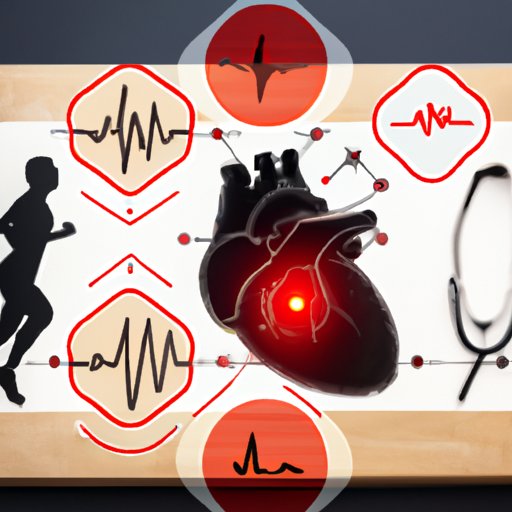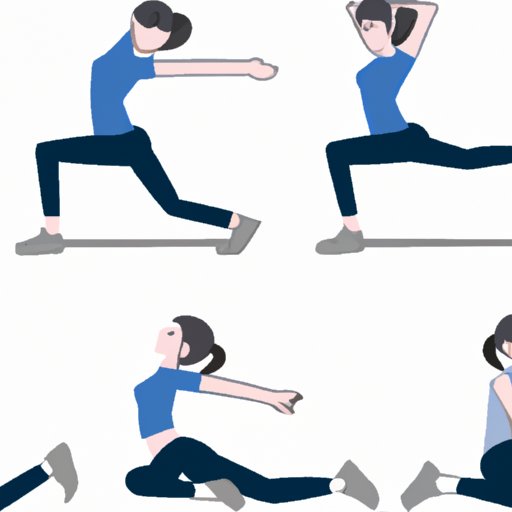Introduction
Exercising regularly is an important part of a healthy lifestyle. Regular physical activity can have a positive impact on both physical and mental health, helping to reduce the risk of chronic diseases and improve overall wellbeing. In this article, we will explore the various benefits of exercise, from its impact on physical health to its effects on mental health and weight loss.
Exploring the Physical Benefits of Exercise
Regular exercise has a number of physical benefits. It can help to increase strength, endurance and flexibility, as well as improve balance and coordination. Let’s take a closer look at each of these benefits in turn.
Increased Strength and Endurance
Exercise can help to build muscle strength and endurance, which can make everyday tasks easier. Strength training exercises, such as weight lifting or bodyweight exercises, are particularly effective at building strength and endurance. They can also help to reduce the risk of injury, as stronger muscles are better able to support the body.
Improved Flexibility
Stretching and flexibility exercises can help to improve range of motion and reduce stiffness in the joints. This can help to prevent injuries, as well as make everyday activities, such as bending down or reaching up, easier. Yoga and Pilates are great forms of exercise for improving flexibility.
Better Balance and Coordination
Balance and coordination are important for preventing falls and injuries. Exercises that involve standing on one leg or using multiple muscle groups at once, such as Tai Chi or dancing, can help to improve balance and coordination.
Examining the Mental Health Benefits of Exercise
Exercise can also have a positive effect on mental health. Studies have shown that regular physical activity can reduce stress and anxiety, improve mood and self-esteem, and even boost cognitive functioning.
Reduced Stress and Anxiety
Exercise can be a great way to manage stress and anxiety. During exercise, the body releases endorphins, which are hormones that can help to reduce stress and elevate mood. Exercise can also provide a distraction from worries and negative thoughts.
Improved Mood and Self-Esteem
Engaging in regular physical activity can help to boost self-esteem and improve mood. As you become more physically fit, you may find yourself feeling more confident and capable of achieving your goals. Additionally, exercising with others can help to create a sense of community and connection.
Improved Cognitive Functioning
Studies have shown that exercise can improve cognitive functioning, such as memory and concentration. This is believed to be due to increased blood flow to the brain during exercise. Additionally, regular physical activity can help to reduce fatigue and improve energy levels, making it easier to stay focused on tasks.

Investigating the Impact of Exercise on Weight Loss
Exercise can be an effective tool for weight loss and management. Here’s how it works:
Calories Burned During Exercise
When you exercise, your body burns calories. The more intense the exercise, the more calories you will burn. Cardiovascular exercises, such as running or cycling, are particularly effective for burning calories.
Increased Metabolism
Exercise can also help to increase your metabolism, which is the rate at which your body burns calories. Regular physical activity can help to keep your metabolism running at an optimal level, even when you’re not actively exercising.
Improved Nutrition
Exercise can also help to promote healthy eating habits. When you’re active, your body craves nutritious fuel to help you perform at your best. Eating a balanced diet can help to make sure you get all the nutrients your body needs.

Exploring the Effects of Exercise on Heart Health
In addition to helping with weight loss, exercise can also have an impact on heart health. Here are some of the ways exercise can benefit the heart:
Lower Blood Pressure
Exercise can help to lower blood pressure by increasing circulation and improving the functioning of the heart. Regular physical activity can also help to reduce levels of LDL (“bad”) cholesterol, which can clog the arteries and lead to heart disease.
Reduced Risk of Cardiovascular Disease
By reducing blood pressure and cholesterol levels, exercise can help to reduce the risk of cardiovascular disease. Regular physical activity can also strengthen the heart muscle, making it more efficient at pumping blood throughout the body.
Improved Cholesterol Levels
Exercise can also help to raise HDL (“good”) cholesterol levels. This type of cholesterol helps to remove LDL cholesterol from the arteries, reducing the risk of heart disease and other health problems.

Studying the Role of Exercise in Preventing Chronic Diseases
Regular physical activity can also help to reduce the risk of chronic diseases, such as diabetes, cancer and arthritis. Here’s how exercise can help:
Diabetes Prevention
Exercise can help to regulate blood sugar levels and reduce the risk of developing type 2 diabetes. Regular physical activity can also help those with diabetes to better manage their condition.
Cancer Prevention
Several studies have linked regular physical activity with a reduced risk of certain cancers, including breast and colon cancer. Exercise can also help to reduce the side effects of cancer treatments, such as fatigue and nausea.
Arthritis Prevention
Exercise can help to reduce joint pain and stiffness associated with arthritis. Low-impact activities, such as swimming or walking, are particularly beneficial for those with arthritis.
Comparing Different Types of Exercise and Their Benefits
There are many different types of exercise, each with its own set of benefits. Here’s a quick overview of three popular types of exercise and their benefits:
Cardiovascular Exercise
Cardiovascular exercise, such as running, cycling or swimming, can help to burn calories, strengthen the heart and lungs, and improve overall fitness. It can also help to reduce stress and improve mood.
Strength Training
Strength training exercises, such as weight lifting or bodyweight exercises, can help to build muscle strength and endurance. This type of exercise can also help to reduce the risk of injury and improve posture.
Flexibility Training
Stretching and flexibility exercises can help to improve range of motion and reduce stiffness in the joints. This type of exercise can also help to prevent injuries and improve balance and coordination.
Conclusion
Exercising regularly can have a positive impact on both physical and mental health. It can help to build strength and endurance, reduce stress and anxiety, promote weight loss, and lower the risk of chronic diseases. Different types of exercise offer different benefits, so it’s important to find an activity that you enjoy and that meets your individual needs. With regular exercise, you can reap the rewards of improved physical and mental wellbeing.
(Note: Is this article not meeting your expectations? Do you have knowledge or insights to share? Unlock new opportunities and expand your reach by joining our authors team. Click Registration to join us and share your expertise with our readers.)
